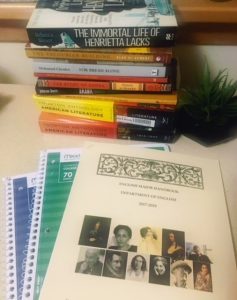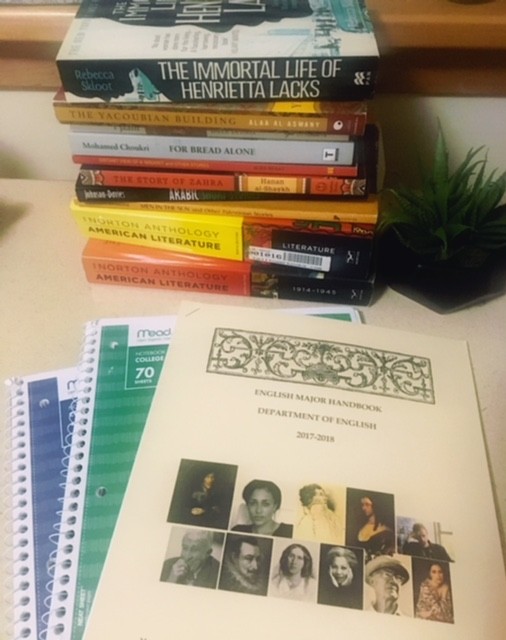 Registration for the spring semester is fast-approaching, and the times they are a-changin’. As you astute English majors have probably already noticed, the English department has undergone major curriculum changes. Graduation requirements along with the English courses themselves have been revised, and this leaves many students confused. That’s why I sat down with English Department Chair Dr. Lars Larson to talk about the new changes. Hopefully, this conversation answers some questions and explains why change can be a good thing.
Registration for the spring semester is fast-approaching, and the times they are a-changin’. As you astute English majors have probably already noticed, the English department has undergone major curriculum changes. Graduation requirements along with the English courses themselves have been revised, and this leaves many students confused. That’s why I sat down with English Department Chair Dr. Lars Larson to talk about the new changes. Hopefully, this conversation answers some questions and explains why change can be a good thing.
LM: As the new chair, you know a lot about the changes going on in the English department. The primary change is obviously the capstone, so can you describe the new spring capstone workshop and what it’s going to be like?
LL: Capstone. It’s a challenging research project because students are largely on their own. The old model is independent study. We match you up with a professor—not always a student’s first choice unfortunately—but someone who has background in the field that the student is interested in. But it’s largely self-patrolled, so people can get lost in the process of researching. We just find that peer networks are one of the best models for getting things done. Being in a group where everybody is doing a similar type of activity, [even if] the specific subject is different…just makes a lot more sense.
We were drawing from other departments on campus that have this model. We wanted a better experience for students and a way to compensate professors for their time. In the old model, no one was getting any credit or compensation for their work with the students. So why not build it into a seminar? Have a professor of record in charge of it. They don’t need to be an expert on the subjects that the various students want to research, but they are expert in learning how to learn. That’s what I think was missing from the old model; there wasn’t enough provision of that learning how to learn. We assumed that the courses they had taken—especially the 400 levels—had geared them up, and I just think a 30-page paper is an entirely new kind of project. That scale is just a different beast.
LM: And it’s probably helpful to just have peers give each other feedback as well.
LL: Exactly. Peer review. We try to remind students that the audience for their papers is not their professors. It’s any given reader out there. That’s how you raise the stakes of your writing. Imagine an audience who’s anonymous. How do you pull them in? How do you interest them and get over the stilted prose that sometimes happens when you write for a professor?
LM: The first time the new capstone is offered is this spring. Will it become the only option for English majors?
LL: Eventually. Students who came in with the old requirements have the option to take it independently. In the next two or three years, it will be phased out. And we encourage even those who are grandfathered in on those old requirements to try this seminar style out, because I think it’s going to be a much better model.
LM: Dr. Hiro is teaching the capstone this spring. Will you rotate who teaches it?
LL: That’s right. She is going to develop the model, and others will build on it.
LM: I remember when we were originally informed about the new capstone the idea was that you’d pick a paper you’d already written for an earlier course and expand on it. Is that still the case or can you come in with a new thesis?
LL: I believe you have the option to come in with a new thesis. But, we were interested in that option of building on something you’ve worked on before and taking it through some transformations. That’s another one of the problems with the independent study model. A lot of students weren’t necessarily building on something that they’d worked with before, so it was totally new to them; and [they had to do it] in the space of what turns out to be less than a semester. It wasn’t enough time for people to get up to that level that we want. It would change if people already had a running head start. It will help get these papers up to a level of complexity that you just can’t get [in] your first go around.
LM: It’s also nice in the sense that you write things and they often fall by the wayside. It’s nice to be able to fully integrate the time you’ve spent at UP.
LL: Absolutely. We really wanted that continuity and to make students’ past classes feel like they are brought to bear on this current problem, which all papers are; they are an attempt at solving a problem. Sometimes, when you write a paper, it’s pretty simple, right? [When you return to it] a kind of interesting dialectical push-and-pull [is] there that can lead to a more complex thesis—something that goes beyond common sense and brings out the value. [It] allows you to struggle a bit more.
LM: Aside from the capstone, there’s going to be changes coming in the form of new survey courses, right?
LL: Well, they started this semester. The old model broke up the historical survey of say British literature into Anglo-Saxon to Medieval, Renaissance, 18th century, Romantic, Victorian, early 20th century, and later 20th century. So British literature alone had seven parts to it. American literature had four different parts.
As a different model, we are going to go a little more speedily. British literature is broken up into two sections. American into two sections as well. British literature splits after the 18th century, so Anglo-Saxon to 18th century—that 1000-year span—and then 19th and 20th century British. American [now] goes from origins to 1900 and [then] 1900 to present. It’s just a bit easier to cover, though we are sacrificing some of the fine-grained focus.
LM: Yeah, I’m thinking about the course American Literature: 1900 to Present, which I’m currently taking from you. We aren’t really reading a lot of full books.
LL: As you know, it is a pretty hasty survey, but it’s a birds-eye view. We wanted to give that intentional, birds-eye overview, because we go into a lot of depth and richness in our genre-based and topic-based courses.
LM: Do you know how long the new curriculum will take to integrate? Is it already in full swing?
LL: This is the model from here on out. As of Fall 2017, that’s the change; so incoming freshmen are pretty much the first people who are 100% on this new model. That means the sophomores, juniors, and seniors have the old standards, but they can incorporate [classes] from the [new] offerings we have.
LM: Given the fact that surveys are now condensed, do you feel like that will be better in the long run at giving our department a better sense of cohesion?
LL: The idea [is] that this simplified survey structure will give students more of a feeling of being in common with each other. For someone who has taken Anglo-Saxon, Contemporary British lit, and maybe an American lit course, it feels so disarticulated, as opposed to [taking] one of four classes. Your peers will have had very similar experiences.
LM: Are there any other changes besides the ones we’ve discussed?
LL: Starting next year [in Fall 2018], minors can take any upper-division English course to satisfy their requirements. Currently, it is to take five courses; two have to be 400 level[s]. We wanted to give a little more freedom to those minors to take what they want, to explore, to be a tourist.
LM: So you won’t have to take a 400-level course anymore?
LL: Nope, as of next fall. One of the complications is that you now need to have taken ENG 225 to be in a 400 level course. So that’s where things got complicated with the minors. It’s partly why we are dropping that requirement, because it means they’ll need that requirement [of ENG 225] to be waived. The reason we started clamping down is because we want that 400 level experience to have a different feel. Fewer people in the class for one. But number two, everybody is up to speed on the critical lenses that ENG 225 instilled. And that just raises the level of discourse—the level at which you can be talking about these texts. There’s not a whole lot of holding hands and taking people through the basics, as we try to do in, say, the surveys.
Thanks to Dr. Larson for sitting down with me! Don’t forget that Spring registration officially begins next Monday. Happy course hunting, English majors!
